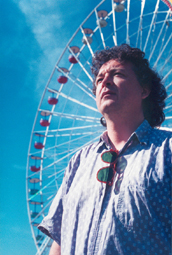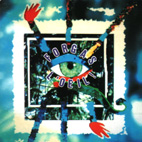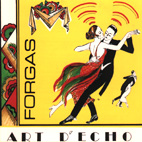PATRICK FORGAS -
A BIOGRAPHY
 Patrick Forgas was 18 years old when he first heard the music
that would change his life : the second Soft Machine album. He would spend the
following years perfecting his drumming technique in several of the bands that
flourished at the time, the early 70's. In 1975, he recorded a demo tape with
Dominique Godin (keyboards and sax) and Didier Thibault (bass), but the latter,
formerly of Moving Gelatine Plates (an excellent French band in the Canterbury
vein, which recorded two acclaimed albums in 1970 and 1971), went on to form
a new version of MGP, taking Godin with him, and leaving Patrick on his own.
Patrick Forgas was 18 years old when he first heard the music
that would change his life : the second Soft Machine album. He would spend the
following years perfecting his drumming technique in several of the bands that
flourished at the time, the early 70's. In 1975, he recorded a demo tape with
Dominique Godin (keyboards and sax) and Didier Thibault (bass), but the latter,
formerly of Moving Gelatine Plates (an excellent French band in the Canterbury
vein, which recorded two acclaimed albums in 1970 and 1971), went on to form
a new version of MGP, taking Godin with him, and leaving Patrick on his own.
Luckily, the tape caught the attention of the new-born Gratte-Ciel label, and
in 1977 he recorded and released his first album Cocktail,
with a cast of musicians which read like a who's who of the French progressive
scene, with former and future members of Magma - Jean-Pierre Fouquey (keyboards),
then only 18 - and the Magma offshoot band Zao - François Debricon (sax/flute),
Patrick Tilleman (violin), and most of all the virtuoso bass player Gérard
Prévost. Most of these musicians went on to become top session players.
Following the uniformly positive
reviews of the album in the press, Forgas formed a touring band, retaining
the services of Laurent Roubach - a guitarist later famous for his guitar duo
albums with Eric Boell - and Tilleman - quickly replaced by Jorge Pinchevsky
of Gong fame, then Jean-Pierre Thirault, the sax player from Lard Free and Mahjun
-, adding Eric Bono and Philippe Talet - both later in the leading French fusion
band, Abus Dangereux. Unfortunately, following the demise of the Gratte-Ciel
label, the band had to break up after just a handful of gigs, opening for Weidorje
and Didier Malherbe's Bloom among others, without recording the projected second
album, of which only a ten-minute medley remains.
 Between
1978 and 1988, Forgas almost stopped playing music. He sold his drum
kit and took on various non musical jobs. He nonetheless continued to write,
with the help of a guitar or a keyboard, which led to an abortive attempt at
mainstream pop success (two singles in the mid-eighties) - albeit with quite
funny lyrics! Thanks to the continued healthy sales of Cocktail through
the Muséa distribution network, Forgas was offered a contract
in 1988, resulting in the 1990 "comeback" album L'Oeil, on which
Fouquey, Roubach and Tilleman from Cocktail, and Didier Malherbe (of
Gong), guested alongside Forgas on vocals, synths and programming.
Between
1978 and 1988, Forgas almost stopped playing music. He sold his drum
kit and took on various non musical jobs. He nonetheless continued to write,
with the help of a guitar or a keyboard, which led to an abortive attempt at
mainstream pop success (two singles in the mid-eighties) - albeit with quite
funny lyrics! Thanks to the continued healthy sales of Cocktail through
the Muséa distribution network, Forgas was offered a contract
in 1988, resulting in the 1990 "comeback" album L'Oeil, on which
Fouquey, Roubach and Tilleman from Cocktail, and Didier Malherbe (of
Gong), guested alongside Forgas on vocals, synths and programming.
 Following
encouragement from various magazines and musicians (among whom none other than
his old inspirator Robert Wyatt), Forgas started work on a third album,
Art D'Echo, inspired by the French surrealist movement of the
1920's, and writer André Breton in particular. Once again, he hired the
talents of several guests, this time including old cohorts Debricon and Thirault,
as well as new friends. Although it was recorded in the same "amateur" conditions,
in Forgas' very small music room (so small, actually, that no more than
two musicians can be inside at the same time!), the sound quality was much better.
And a special track, "Poltergeist", marked Forgas's first drum playing in years.
Following
encouragement from various magazines and musicians (among whom none other than
his old inspirator Robert Wyatt), Forgas started work on a third album,
Art D'Echo, inspired by the French surrealist movement of the
1920's, and writer André Breton in particular. Once again, he hired the
talents of several guests, this time including old cohorts Debricon and Thirault,
as well as new friends. Although it was recorded in the same "amateur" conditions,
in Forgas' very small music room (so small, actually, that no more than
two musicians can be inside at the same time!), the sound quality was much better.
And a special track, "Poltergeist", marked Forgas's first drum playing in years.
The idea of forming a new
live band rapidly followed, and the next three years were spent looking for
the suitable musicians and rehearsing a new repertoire, centered on two epic
compositions, "Rumeurs" (later retitled "Roue Libre") and "Sérum De Vérité").
A shorter track, "Déclic", was added in time for the recording sessions
in March 1997. Roue Libre was released on Cosmos Music in December
1997, and was promoted by a series of gigs in and around Paris. Following more
personnel changes, Forgas Band Phenomena went back into the studio in
January 1999 to record the follow-up, Extra-Lucide, which was
released in December 1999.
The band then went on a long hiatus, re-emerging stronger than
ever in 2004 and releasing the live CD Soleil 12 on
Cuneiform Records the following year. It consisted for a large part of re-worked
version of the two suites originally intended for the 1978 album, "Coup
De Théâtre" and a new version of "Pieuvre A La Pluie",
plus two recent compositions, "Soleil 12" and "Eclipse".
Patrick went on to compose material for a new CD in 2005-06, which after the
obligatory road-testing was recorded in the summer of 2008, just before the
band embarked on a memorable trip to South Korea. L'Axe Du Fou
is slated for release in January 2009, again on Cuneiform.
 Patrick Forgas was 18 years old when he first heard the music
that would change his life : the second Soft Machine album. He would spend the
following years perfecting his drumming technique in several of the bands that
flourished at the time, the early 70's. In 1975, he recorded a demo tape with
Dominique Godin (keyboards and sax) and Didier Thibault (bass), but the latter,
formerly of Moving Gelatine Plates (an excellent French band in the Canterbury
vein, which recorded two acclaimed albums in 1970 and 1971), went on to form
a new version of MGP, taking Godin with him, and leaving Patrick on his own.
Patrick Forgas was 18 years old when he first heard the music
that would change his life : the second Soft Machine album. He would spend the
following years perfecting his drumming technique in several of the bands that
flourished at the time, the early 70's. In 1975, he recorded a demo tape with
Dominique Godin (keyboards and sax) and Didier Thibault (bass), but the latter,
formerly of Moving Gelatine Plates (an excellent French band in the Canterbury
vein, which recorded two acclaimed albums in 1970 and 1971), went on to form
a new version of MGP, taking Godin with him, and leaving Patrick on his own. Between
1978 and 1988, Forgas almost stopped playing music. He sold his drum
kit and took on various non musical jobs. He nonetheless continued to write,
with the help of a guitar or a keyboard, which led to an abortive attempt at
mainstream pop success (two singles in the mid-eighties) - albeit with quite
funny lyrics! Thanks to the continued healthy sales of Cocktail through
the Muséa distribution network, Forgas was offered a contract
in 1988, resulting in the 1990 "comeback" album L'Oeil, on which
Fouquey, Roubach and Tilleman from Cocktail, and Didier Malherbe (of
Gong), guested alongside Forgas on vocals, synths and programming.
Between
1978 and 1988, Forgas almost stopped playing music. He sold his drum
kit and took on various non musical jobs. He nonetheless continued to write,
with the help of a guitar or a keyboard, which led to an abortive attempt at
mainstream pop success (two singles in the mid-eighties) - albeit with quite
funny lyrics! Thanks to the continued healthy sales of Cocktail through
the Muséa distribution network, Forgas was offered a contract
in 1988, resulting in the 1990 "comeback" album L'Oeil, on which
Fouquey, Roubach and Tilleman from Cocktail, and Didier Malherbe (of
Gong), guested alongside Forgas on vocals, synths and programming. Following
encouragement from various magazines and musicians (among whom none other than
his old inspirator Robert Wyatt), Forgas started work on a third album,
Art D'Echo, inspired by the French surrealist movement of the
1920's, and writer André Breton in particular. Once again, he hired the
talents of several guests, this time including old cohorts Debricon and Thirault,
as well as new friends. Although it was recorded in the same "amateur" conditions,
in Forgas' very small music room (so small, actually, that no more than
two musicians can be inside at the same time!), the sound quality was much better.
And a special track, "Poltergeist", marked Forgas's first drum playing in years.
Following
encouragement from various magazines and musicians (among whom none other than
his old inspirator Robert Wyatt), Forgas started work on a third album,
Art D'Echo, inspired by the French surrealist movement of the
1920's, and writer André Breton in particular. Once again, he hired the
talents of several guests, this time including old cohorts Debricon and Thirault,
as well as new friends. Although it was recorded in the same "amateur" conditions,
in Forgas' very small music room (so small, actually, that no more than
two musicians can be inside at the same time!), the sound quality was much better.
And a special track, "Poltergeist", marked Forgas's first drum playing in years.